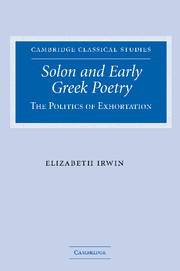Book contents
- Frontmatter
- Contents
- Acknowledgements
- List of abbreviations and editions
- Introduction
- PART I THE POLITICS OF EXHORTATION
- PART II POLITICAL POETICS: SOLON'S EUNOMIA
- PART III POETRY AND POLITICAL CULTURE
- Conclusion
- Appendix I Who were Tyrtaeus' gymnetes?
- Appendix II λυκάβαντος: when the wolf comes?
- Bibliography
- General index
- Index locorum
Conclusion
Published online by Cambridge University Press: 05 November 2009
- Frontmatter
- Contents
- Acknowledgements
- List of abbreviations and editions
- Introduction
- PART I THE POLITICS OF EXHORTATION
- PART II POLITICAL POETICS: SOLON'S EUNOMIA
- PART III POETRY AND POLITICAL CULTURE
- Conclusion
- Appendix I Who were Tyrtaeus' gymnetes?
- Appendix II λυκάβαντος: when the wolf comes?
- Bibliography
- General index
- Index locorum
Summary
A careful examination of one tradition of elegy helped to generate conclusions about the relationship of archaic poetry to its contemporary environment. A gentle disengagement from previously imposed narratives combined with close reading led to a greater appreciation of the role of poetry in articulating the political in archaic Greece, and more specifically to a re-evaluation of the poetry and political career of Solon. Several interrelated narratives emerged – narratives about martial exhortation elegy and epic role-playing, about Solon, and about tyrants – all thematically related through their focus on the fluid dynamic existing between political and poetic discourse in the archaic period. Poetic traditions provided Solon and his contemporaries with an important medium for reflecting and even fashioning political and social relations, while, in turn, political concerns influenced poetic composition and its performance. This Conclusion draws together the main themes of this book, and indicates directions in which these new readings may lead.
In Part I, a new interpretation of the political content of elegiac paraenesis demonstrated how poetic traditions could be harnessed to the needs of particular groups. Best seen as epic role-playing, recitation of elegiac paraenesis at the symposium provided a medium through which symposiasts asserted their own elevated position within a social hierarchy modelled on that of the warriors of epic. Political consequences are implicit in such poetic appropriation.
- Type
- Chapter
- Information
- Solon and Early Greek PoetryThe Politics of Exhortation, pp. 281 - 290Publisher: Cambridge University PressPrint publication year: 2005

